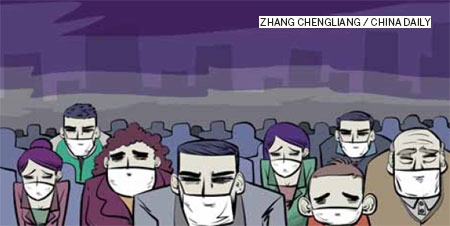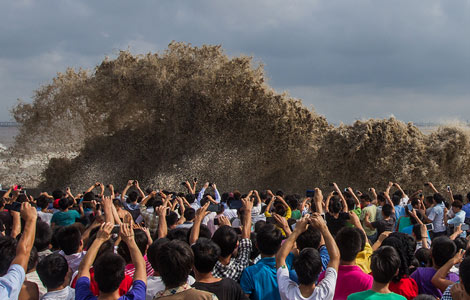Smog crisis tries the limits of people's patience
Updated: 2013-12-20 10:04
By Bai Ping (China Daily Europe)
|
|||||||||||
Fears that emergency measures may be too little, too late
Chinese people have traditionally cherished the virtue of "eating bitter", or the ability to endure hardships without complaint. As a befitting sign of their tenacity to achieve a worthy goal despite extreme difficulties, the Chinese character for perseverance is a knife suspended over a heart.
But breathing smoggy air has unnerved even the toughest among them as it is becoming part of daily life and they see no bright spot at the end of the proverbial tunnel. The nation that has enjoyed unprecedented economic prosperity was shrouded by a collective concern over the smothering smog, which has piled gloom upon Beijing and its neighboring provinces in northern China in recent years, and swept across more than 100 central and eastern cities early this month.
The smog and filthy air forced the closure of schools and a ban on private cars. Hapless residents anxiously waited for strong winds to blow away the particulate matter, aware as they were of doctors' warnings that the suffocating, apocalyptic-like smog could cause respiratory diseases.

Even in the current lull of blue skies, people fear smog will strike any time soon and despair the nation's lack of a coherent and viable strategy to deter its invasion.
After Beijing recorded record levels of air pollution in January and jittery that heavy pollution would strike the capital again this winter, the government has ordered the city and its surrounding areas to halt production and reduce outputs to curb emissions in severe situations.
However, as smog continues to shroud large parts of the country with even greater ferocity, people have begun to wonder whether such emergency measures may be too little, too late.
The latest onslaught of smog appeared to have caught offguard even environmental officials, who acknowledged that the measures scrambled by cities could alleviate conditions, but only with very limited effect. Experts have become more pessimistic about the prospects of the battle for clear blue skies as they foresee chronic air pollution for another 10-20 years as China's urbanization accelerates and clusters of cities continue to mushroom.
More significantly, people believe many officials still lack the will to act fast because their political careers hinge on economic performance rather than environmental protection that can be costly and slow the pace of local growth.
Critics have even shrugged off a recent move by northern Liaoning province to fine some of its cities for failing to meet air quality standards. The sums, ranging from 400,000 yuan ($65,870, 47,860 euros) to 34.6 million yuan for a city, are considered insignificant and at best could serve as a slap on the wrist for those in charge.
Although the government has vowed to hold top local officials accountable if heavy air pollution continues for three consecutive days because of their slackness or negligence, there has been no report of someone being punished for the latest wave of smog.
But even the most GDP-obsessed bureaucrats now cannot ignore the surging undercurrent of public dissatisfaction. Chinese social media are rife with satires on life under the pall of pollution and smoke, and attempts to play down the environmental woes have drawn wide condemnation.
Over the week, people have been up in arms over an article posted on the website of China's national television broadcaster that told of "five unforeseen benefits" of the country's severe air pollution: It unites Chinese people, makes them more equal, accords them more knowledge, raises their awareness of the cost of economic development, and gives them a better sense of humor.
Perhaps it is just another satire aimed at making people think more about the issue. Perhaps it is not. I do not know if this is what the author means, but I do agree everybody is equal before smog that seeps into people's homes and harms their health.
The author is editor-at-large of China Daily. Contact the writer at dr.baiping@chinadaily.com.cn

(China Daily European Weekly 12/20/2013 page13)
Today's Top News
Chinese merchant killed during robbery in Russia
IPR courts 'would be helpful'
Liaoning's combat capability tested
GM corn rejection not to hurt market
US aircraft hit by gunfire in South Sudan
Memorials mark Lockerbie attack
H5N2 outbreak confirmed in N China
China's moon rover works stably
Hot Topics
Lunar probe , China growth forecasts, Emission rules get tougher, China seen through 'colored lens', International board,
Editor's Picks

|

|

|

|

|

|





